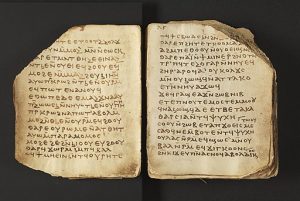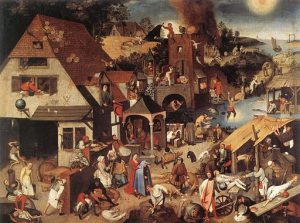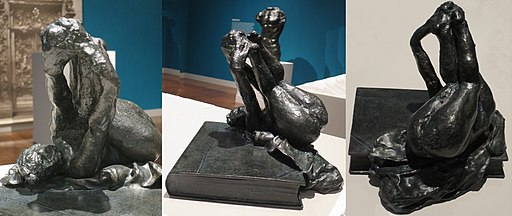13 Teaching Wisdom

The Books of Proverbs and Ecclesiastes: Is the universe inherently just?
Proverbs
Proverbs is a classic book of Wisdom. Its final form came in post-exilic times, but a great deal of its content is considerably older. There are many similarities between Proverbs and various Egyptian and Canaanite Wisdom literature collections, which suggests that Israel assimilated Wisdom material from a broad regional exchange of materials. Although traditions attributes the book to King Solomon, there is clear internal evidence that many authors were a part of the collection that became this book.
The chief aim of Proverbs seems to be that one needed to become wise in order to truly live a good life. The sayings and teachings in Proverbs are intended to educate the sons of the community.
The first nine chapters of Proverbs is formal teaching materials, aimed at young men who are approaching the responsibilities of adulthood, and are very much focused on a description of what behaviors are wise, and what humans should seek out in in order to live a good and worthwhile life.
Proverbs 1:2-7
For learning about wisdom and instruction,
for understanding words of insight,
3 for gaining instruction in wise dealing,
righteousness, justice, and equity;
4 to teach shrewdness to the simple,
knowledge and prudence to the young—
5 let the wise also hear and gain in learning,
and the discerning acquire skill,
6 to understand a proverb and a figure,
the words of the wise and their riddles.
7 The fear of the Lord is the beginning of knowledge;
fools despise wisdom and instruction.” (NRSV)
Then, at this point, the concept of wisdom is put into a metaphorical human form. Wisdom is pictured as a virtuous woman who promises insight and counsel to those who seek after her and all her ways. She is contrasted with a foolish woman and a strange woman as the first 9 chapters continue, and the contrast is making multiple points about appropriate adult behavior. One is to follow her, this Wisdom personified, in gaining true ethical perspectives and behavior. Wisdom was created before all other created things, says Proverbs. Proverbs also states that Wisdom assisted Yahweh in the act of creation, in the actual ordering of the universe. Wisdom was, in fact, with God during creation.
Proverbs 1:20-23
“Wisdom cries out in the street;
in the squares she raises her voice.
21 At the busiest corner she cries out;
at the entrance of the city gates she speaks:
22 “How long, O simple ones, will you love being simple?
How long will scoffers delight in their scoffing
and fools hate knowledge?
23 Give heed to my reproof;
I will pour out my thoughts to you;
I will make my words known to you.” (NRSV)
Proverbs 3:19-20
19 The Lord by wisdom founded the earth;
by understanding he established the heavens;
20 by his knowledge the deeps broke open,
and the clouds drop down the dew.
Proverbs 8:22-31 describes Wisdom’s origins:
“The Lord created me at the beginning of his work,
the first of his acts of long ago.
23 Ages ago I was set up,
at the first, before the beginning of the earth.
24 When there were no depths I was brought forth,
when there were no springs abounding with water.
25 Before the mountains had been shaped,
before the hills, I was brought forth—
26 when he had not yet made earth and fields,
or the world’s first bits of soil.
27 When he established the heavens, I was there,
when he drew a circle on the face of the deep,
28 when he made firm the skies above,
when he established the fountains of the deep,
29 when he assigned to the sea its limit,
so that the waters might not transgress his command,
when he marked out the foundations of the earth,
30 then I was beside him, like a master worker;
and I was daily his delight,
rejoicing before him always,
31 rejoicing in his inhabited world
and delighting in the human race.” (NRSV)

Wisdom, as she speaks in the first section of Proverbs, values hard work and honesty, warns against excessive sleep, sex, and wine, recommends diligence in business affairs, kindness, loyalty, impartiality, sobriety, humility, restraint, and sincerity. Wealth is very nice, she says, but it’s not to be desired at the cost of calmness and peace. The first section, therefore, is advice on how to be a wise and virtuous person. Proverbs declares that it is more valuable than gold!
Proverbs 8: 10-11
“10 Take my instruction instead of silver,
and knowledge rather than choice gold;
11 for wisdom is better than jewels,
and all that you may desire cannot compare with her.” (NRSV)
After the section in chapters 1-9 come a whole series of classic 2 line proverbs, continuing all through chapters 29, albeit with various authors and differing emphases. Chapters 30-31 contain a dialogue on wisdom, a prayer, teaching on sobriety, and a very interesting description of the ideal wife and woman.
The Wisdom sayings that appear in Proverbs are generally short two-line sentences in which the second line runs parallel in some way to the first. Some scholars have classified the different kinds of parallelism found in the book of Proverbs, and they are similar to the types of parallelism found in the Psalms.
An example of synonymous parallelism, where the second line is essentially synonymous with the first is found in Proverbs 22:1.
“A good name is to be chosen rather then great riches
And favor is better then silver and gold,”
In antithetic parallelism the two lines form a balanced pair of opposites, so in Proverbs 10:1,
“A wise son makes a glad father
But a foolish son is a sorrow to his mother”
When the second line seems to complete the thought of the first, it’s called ascending parallelism. We find that in Proverbs 11:22,
“Like a gold ring in the snout of a pig
Is a beautiful woman bereft of sense.”

One section of Proverbs that has caused some interesting dialogue (some find this material highly encouraging for women’s rights, some despair over the limits clearly set on the role of women here, and there is likely never going to be agreement on the meanings found in this section ) has been the section known as the Ideal Wife, or the Virtuous Woman found at the end of the book of Proverbs in chapter 31:10-31. Much is made of her organizational skills, her ability to work endless hours, her extraordinary housekeeping, her business acuity, her good humor, and her wisdom. She is the human form of Wisdom, the female aid to Yahweh found at the beginning of the book of Proverbs. This clear description of Wisdom as female, both at the beginning and the end, makes an interesting bracketing for the book.
One clear and unmistakable characteristic of the Book of Proverbs is its certainty that both the righteous and the wicked of the world receive what they deserve in this life. God’s just providence and a moral world order are not questioned. The wise person’s deeds are good and will bring happiness and success. The foolish person’s deeds are evil and will lead to failure and ruin. The key idea is that a truly wise person knows that the world is essentially coherent. It’s ethically ordered. There are clear laws of reward and punishment that exist in the world.
This insistence on the basic justice inherent in creation and the power of wisdom (or fear of the Lord) to guarantee success and security was one strand of ancient Israelite thought. It was a regular response to the many and varied historic catastrophes that had befallen Israel as a nation. This perspective has been obvious since the Deuteronomistic school, which was clearly unwilling to relinquish the idea of a moral God in control of history and preferring to infer the nation’s sinfulness caused its suffering and calamity. Better to blame the sufferer, Israel, and so keep God and the system of divine retributive justice intact. The prophets, too, attributed Israel’s misfortunes to Israel and God’s justice, not to anything that might describe Israel as an innocent victim of circumstance instead.

Ecclesiastes
The name “Ecclesiastes” is a Greek translation of the Hebrew Qohelet, which means Teacher, or Preacher, or even Gatherer. Again, this book has been attributed to King Solomon, but other than in the introduction, there is nothing in the narrative that indicates that this writing is coming from the perspective of royalty. In fact, the content of this book seems to clearly come from a perspective outside of any royal court.
Dating Ecclesiastes is a little difficult, but the lack of Greek words and the frequent use of Aramaic (which became the commonly spoken language in Israel after the exile), as well as a number of historic issues that did not arise until the Persian period or later means that Ecclesiastes was likely written sometime between 450-300 BCE.
It is important to recognize the reality of Israel’s situation under the Persian empire’s control. The people of Israel and Judah had been allowed to go home to Israel when Cyrus of Persia conquered Babylon and sent the conquered people of a number of nations back home from their exile in Babylon. There was some relative independence for Israel as they rebuilt Jerusalem, built the second temple, and re-established their religious practices. But Persia considered Israel a part of its empire, and so the position of any one person, even one of some importance in Israel, still needs to be seen against the reality of a rather enormous and powerful empire. The perspective in Ecclesiastes is that of a powerless person who realizes that the universe will continue on, with little thought for any one individual. People live in a world where they ultimately have no control, and only God has real power.
The emphasis in Ecclesiastes is that all humans–rich and poor, king and peasant, good and bad–will die. So humans cannot do anything but live in the moment, enjoying life for the good things found in the moment, being aware that most of life is still vanity. God determines the time and the timing of events.
This is found in the very well known passage of Ecclesiastes 3:
“For everything there is a season, and a time for every matter under heaven:
2 a time to be born, and a time to die;
a time to plant, and a time to pluck up what is planted;
3 a time to kill, and a time to heal;
a time to break down, and a time to build up;
4 a time to weep, and a time to laugh;
a time to mourn, and a time to dance;
5 a time to throw away stones, and a time to gather stones together;
a time to embrace, and a time to refrain from embracing;
6 a time to seek, and a time to lose;
a time to keep, and a time to throw away;
7 a time to tear, and a time to sew;
a time to keep silence, and a time to speak;
8 a time to love, and a time to hate;
a time for war, and a time for peace.
9 What gain have the workers from their toil? 10 I have seen the business that God has given to everyone to be busy with. 11 He has made everything suitable for its time; moreover he has put a sense of past and future into their minds, yet they cannot find out what God has done from the beginning to the end. 12 I know that there is nothing better for them than to be happy and enjoy themselves as long as they live; 13 moreover, it is God’s gift that all should eat and drink and take pleasure in all their toil. 14 I know that whatever God does endures forever; nothing can be added to it, nor anything taken from it; God has done this, so that all should stand in awe before him. 15 That which is, already has been; that which is to be, already is; and God seeks out what has gone by.
16 Moreover I saw under the sun that in the place of justice, wickedness was there, and in the place of righteousness, wickedness was there as well. 17 I said in my heart, God will judge the righteous and the wicked, for he has appointed a time for every matter, and for every work. 18 I said in my heart with regard to human beings that God is testing them to show that they are but animals. 19 For the fate of humans and the fate of animals is the same; as one dies, so dies the other. They all have the same breath, and humans have no advantage over the animals; for all is vanity. 20 All go to one place; all are from the dust, and all turn to dust again. 21 Who knows whether the human spirit goes upward and the spirit of animals goes downward to the earth? 22 So I saw that there is nothing better than that all should enjoy their work, for that is their lot; who can bring them to see what will be after them?” (NRSV)
The book chastises, encourages one to live enjoying God’s creation, to be generous, and to gain wisdom, but there is the overarching theme, stated at the beginning and at the end of the book, that all of it is actually still vanity. The world is indifferent to the individual, and humans need to understand and acknowledge this. Human life ends, each life, and the control belongs to God.
It is not a particularly cheery book, with little of the optimistic emphasis on success following virtue found in Proverbs, but there is a strong emphasis on encouraging people to enjoy their lives, to share willingly, to work hard and to be good. It is also true that even while doing all this, that every person’s days are numbered, and humans will end up as the dust that was used to create humanity. Still, it is far better to have a job than not, better to enjoy life than wallow in misery, better to gain knowledge than live in ignorance.
Job also addresses issue of living and wisdom, but it is more focused on the concepts of suffering and whether humans always deserve the suffering that befalls them. This is a book that deserves its own chapter!

May, Herbert G., et al. The New Oxford Annotated Bible with the Apocrypha: Revised Standard Version, Containing the Second Edition of the New Testament and an Expanded Edition of the Apocrypha. Edited by Michael D Coogan, Oxford University Press, 2007.
Gabel, John B. The Bible as Literature: An Introduction. Oxford University Press, 2006.
British Library Sacred Texts, Sept. 2019, https://www.bl.uk/sacred-texts/
